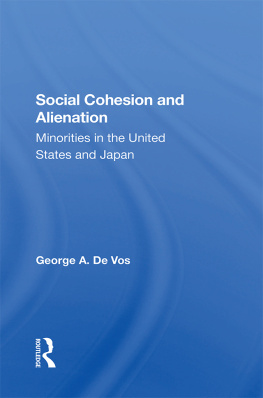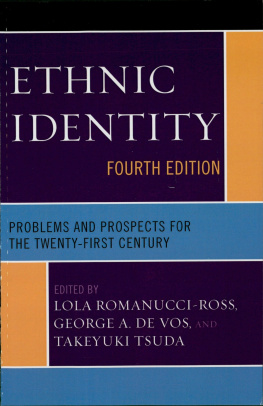First published 1992 by Westview Press, Inc.
Published 2019 by Routledge
52 Vanderbilt Avenue, New York, NY 10017
2 Park Square, Milton Park, Abingdon, Oxon OX14 4RN
Routledge is an imprint of the Taylor & Francis Group, an informa business
Copyright 1992 Taylor & Francis
All rights reserved. No part of this book may be reprinted or reproduced or utilised in any form or by any electronic, mechanical, or other means, now known or hereafter invented, including photocopying and recording, or in any information storage or retrieval system, without permission in writing from the publishers.
Notice:
Product or corporate names may be trademarks or registered trademarks, and are used only for identification and explanation without intent to infringe.
Library of Congress Cataloging-in-Publication Data
De Vos, George A.
Social cohesion and alienation: minorities in the United States
and Japan / by George De Vos.
p. cm.
Includes bibliographical references.
ISBN 0-8133-8532-6
1. JapanSocial conditionsCross-cultural studies.
2. MinoritiesJapanCross-cultural studies. 3. Alienation (Social
psychology)JapanCross-cultural studies. 4. Social groups
Psychological aspectsCross-cultural studies. 5. United States
Social conditionsCross-cultural studies. 6. MinoritiesUnited
StatesCross-cultural studies. 7. Alienation (Social psychology)
United StatesCross-cultural studies. I. Title.
HN725.D4 1992
302.5'44'0952dc20 92-2859
CIP
ISBN 13: 978-0-367-28749-8 (hbk)
An attempt at a final summary of much of my work in anthropology has been divided into two separate volumes, Status Inequality: The Self in Culture, 1990, published by Sage Publications and this present volume, Social Cohesion and Alienation: Minorities in the United States and Japan. Many of the themes touched upon in both volumes have appeared in a series of writings that stretch through a period starting in the early sixties through the late eighties. Some of these efforts resulted in books; others appeared separately as invited contributions to symposia, as special issues of journals, or as parts of edited volumes.
In the first volume, Status Inequality, I attempted some theoretical integration of themes tying together most of my writings about the structure and experience of social inequality. I recombined theoretical topics previously treated separately and attempted to make clear how a concern with status has been a driving force throughout my approach to the self in culture. The generalizations presented are derived in good part from my anthropological researches about Japan and the Japanese over the past forty years.
Throughout, my studies of self in society have been focused rather specifically on the effects of minority status as it influences both individual and group behavior in a Japanese context. They have also been, in my own mind, directly related to the possibilities of a more general psychocultural theory. What I have done in the former volume is to leave out the content of my research in Japan so as to bring out my unifying theory more centrally. I combined topics, restructuring themes from various previous writings while adding new incisive contributions by Marcelo Surez-Orozco. I attempted a more interrelated, consistent psychocultural theoretical approach than found in my individual writings, drawing upon more encompassing anthropological, sociological and psychoanalytic insights into human behavior.
In what follows in this volume, I refer only in briefer form to the larger theoretical structure presented more fully in Status Inequality. These theoretical issues are illustrated in this present work as I attend more specifically to Japanese society and culture and how it serves as a comparative foil for understanding the operation of social cohesion and minority alienation in the contemporary American society. I attempt a retrospective comparative overview of much of my specific work within Japanese culture as it reflects both the continuing presence of several forms of status inequality and the vicissitudes of social conformity and deviancy in Japan, past and present.
This volume is not a research report. Rather, it comprises my reflections and conclusions about certain topics about which my own detailed research reports gave concrete evidence. This is not a summary of the evidence itself. The detailed empirical findings on which my contentions are based are found in other publications and will not be repeated here. I cite in footnotes in appropriate places where these empirical studies are to be located.
Comparing the Japanese with the segmentation of contemporary American multiethnic society, I pay special attention to the differing underlying psychocultural determinants of class, caste, age, gender, and ethnic identity in Japan, as distinct from or similar to those operative in a Western setting. My theoretical orientation, detailed in Status Inequality, has been developed in the context of a continual attempt to synthesize structural approaches that many social scientists consider antithetical. To reconcile the seeming opposites of social structure and personality structure, I have traced out intertwining strands around which I have woven my own observations and research.
My first thread of argument throughout my work has remained sociological in nature. These are the perspectives on societal processes that I first learned as an undergraduate in sociology from exponents of the "Chicago School," who in the 1930s advocated ecological studies of the city. They viewed crime, delinquency and mental health problems as social indices of what Durkheim called anomy--breakdowns in social cohesion within urban communities. To this approach, which permeated the theory to which I was exposed at the University of Chicago during the early 1940s, I blended in the Durkheimian theoretical background and research approach of my principal mentor, Lloyd Warner, who in studying urban American culture was in the 1930s already advocating what have now become "urban anthropology" and "symbolic anthropology." He was an advocate of both Durkheimian and British functionalist approaches acquired in good part directly through Radcliffe-Brown.
In the late 1930s, he had turned from his previous very perceptive study of Australian aboriginal kinship and ritual to a pioneering detailed anthropological analysis of urban American society itself, as represented by Newburyport, Massachusetts. Social class for him was various forms of symbolic participation and communication that segmented the society. He saw the layering of American society into six strata. Starting at the top, his "upper upper" class was defined by prestige or status in the Weberian sense, as well as by economic considerations. In the U.S. there remain "old family" considerations as criteria. In the "lower upper" class were those who were nouveau riche, who could not immediately enter the top rung. His "upper middle" class basically comprised higher business executives, wealthier merchants and higher status professionals. In his "lower middle" class were white-collar and office personnel. Education, as
Such sociological approaches to social behavior and social motivation are deemed by many to be diametrically opposed to the application of psychoanalytic theory to socially motivated behavior. However, to the contrary, I have from the beginning felt compelled to find means of reconciling and relating structural considerations of social cohesion and social status to concepts of "personality," which have been developing around a structural approach to ego psychology derivative of but not totally dependent on Freudian psychoanalysis. A second thread of my work, therefore, has been guided by a professional dedication to psychodynamic psychology and research methods using psychological tests applied cross-culturally.









